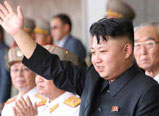
As Wang recounts the old days, Barr sits nearby nodding, with occasional demur signals to him to keep his narrative briefer.
"Look at her," Wang says with teasing love. "She tells me to stop, so I don't dare to say a thing."
Born in 1933 in Shanghai, Barr grew up in a family outside the circle of wealthy expatriates of the time, but her life was certainly more comfortable than most Chinese. The family stayed in Shanghai all through the war, including the two years when they were interned in the notorious Lunghwa Camp by the Japanese.
"I hold a British passport and I have had American education, but I didn't feel at home in either place," Barr says.
She longed to return to her birthplace. Trained as a teacher, she managed to get as close as she could at the time, taking a job in Hong Kong. In 1973, when she heard about two-year teaching contracts available in Shanghai, she quickly applied and was accepted.
When Barr was back in her birthplace at last, Wang and his first wife befriended her. Even after her contract expired and Barr returned to Britain, she kept up correspondence with Schofield. After Schofield's death in 1983, she continued to write to Wang. A letter in those days took 10 days.
One day in 1984, Wang popped the question, proposing marriage in a letter. She replied with a telegram: "YES LOVE BETTY."
She returned to Shanghai, and they were married in the former Shanghai city government building. To celebrate, they went to the Friendship Store, at the time restricted to foreign passport holders, and each had a coke.
China misunderstood
"I shared with him the same dream," Barr says. "Some people said I was brainwashed - by him - but they had never been to China."
The Wangs take a two-month trip every summer. They have been to every province on China's mainland and have visited the United States and Europe.
"When we travel abroad, we discover that a lot of people know very little about China," Wang says. "We have the duty to let them know, slowly, slowly, about China."
Like many expatriates who have lived in China long enough to understand its people, history and culture, the Wangs are always disappointed that many Westerners base their opinions about China on articles criticizing the country.
"China has many problems, like everywhere else in the world, and like many Western countries when they were developing," Wang says. "But it has also done wonderful things to improve the lives of people - people like me. It is not fair to see it all from just one side."
Indeed, the Wangs have witnessed dramatic changes first-hand in the past seven decades. China has been transformed into a more modern society, with rising standards of living and renewed hope for the future. Their dreams of the past have become the foundation of new generations.
Their story made fascinating reading in one of the books they co-authored - "Shanghai Boy, Shanghai Girl." Published in English in 2002, it depicts the less glitzy side of life in Shanghai in the 1930s.
The couple have voluntarily helped to compile some other publications to enable foreign readers to understand modern Chinese history.

















 Singer in spotlight after blog post
Singer in spotlight after blog post


![]()
